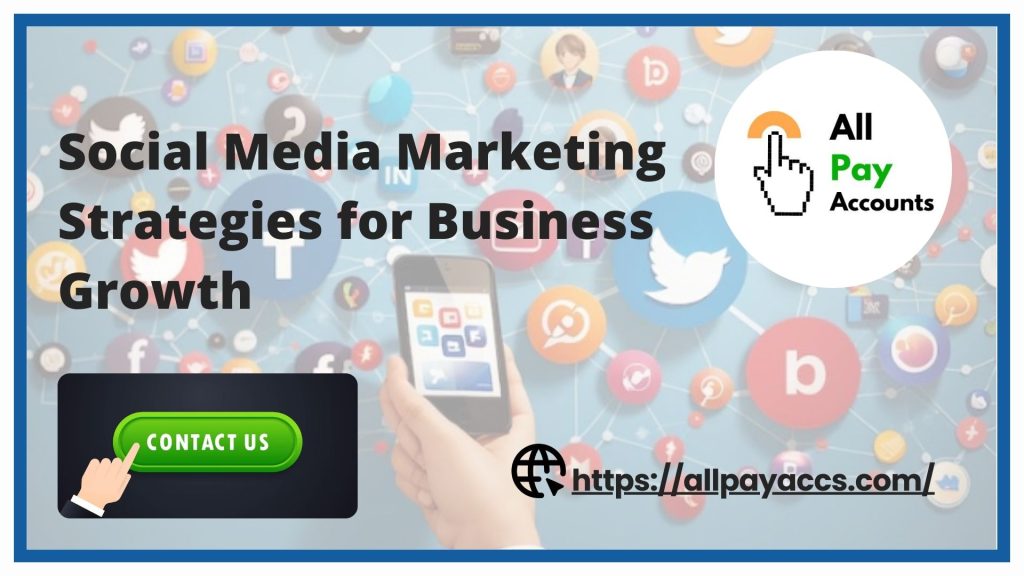Social Media Marketing Strategies for Business Growth

In today’s digital world, social media marketing has become an essential tool for businesses looking to expand their reach, increase brand awareness, and drive sales. With billions of users actively engaging on platforms like Facebook, Instagram, LinkedIn, Twitter, and TikTok, leveraging these channels effectively can lead to exponential business growth. Just being present on social media isn’t sufficient. You need a well-defined strategy to stand out, attract the right audience, and convert them into loyal customers.
In this article, we will explore proven social media marketing strategies that will help businesses achieve sustained growth. Whether you’re a startup, small business, or a large corporation, these strategies will provide actionable insights to improve your online presence and ROI.
1. Define Clear Goals and Objectives
Before diving into social media marketing, it’s crucial to set clear goals that align with your overall business strategy. Ask yourself:
Do you want to increase brand awareness?
Are you looking to generate leads and conversions?
Do you want to enhance customer engagement?
Are you focusing on building a community around your brand?
Setting SMART (Specific, Measurable, Achievable, Relevant, and Time-bound) goals ensures that your social media efforts are focused and measurable.
2. Identify Your Target Audience
Understanding who your audience is will help you craft relevant content that resonates with them. Analyze factors such as:
Demographics: Age, gender, location, income level
Psychographics: Interests, values, lifestyle
Online Behavior: Preferred social media platforms, types of content they engage with
Use analytics tools like Facebook Insights, Google Analytics, and Instagram Analytics to gather data about your audience and tailor your content accordingly.
3. Choose the Right Social Media Platforms
Not all social media platforms align with your business needs. Each platform caters to a different type of audience and content style:
Facebook: Best for community building and advertising
Instagram: Ideal for visual content and younger audiences
LinkedIn: Perfect for B2B marketing and professional networking
Twitter: Great for real-time engagement and news updates
TikTok: Excellent for short-form, viral content and Gen Z audience
Focus your efforts on platforms where your audience is most active to maximize engagement and results.
4. Create High-Quality and Engaging Content
Quality content serves as the foundation of a thriving social media strategy. It should be insightful, captivating, and visually striking. Some effective content types include:
Blog posts and articles that educate and provide value
Videos and live streams for greater engagement
Infographics to simplify complex information
User-generated content to build trust and authenticity
Polls and quizzes to encourage interaction
Consistency is key. Develop a content calendar to plan and schedule posts ahead of time.
5. Utilize Social Media Advertising
Organic reach alone may not be enough to achieve your business goals. Paid social media advertising helps businesses target specific audiences with precision. Some effective ad formats include:
Facebook and Instagram Ads (carousel, video, story ads)
LinkedIn Ads (sponsored posts, InMail campaigns)
Twitter Ads (promoted tweets, trending topics)
TikTok Ads (branded hashtag challenges, in-feed ads)
Invest in A/B testing to analyze what works best and optimize your ad campaigns for better ROI.
6. Leverage Influencer Marketing
Influencer marketing has gained immense popularity due to its ability to build trust and credibility. Collaborating with industry-relevant influencers can significantly expand your brand’s visibility.
When choosing influencers, consider:
Relevance: Do they align with your brand values?
Audience Interaction: Is their following active and genuinely engaged?
Authenticity: Do they have a genuine connection with their followers?
Micro-influencers (10K–50K followers) often have higher engagement rates and offer cost-effective marketing opportunities.
7. Engage With Your Audience
Social media is a two-way communication channel. Actively engage with your followers by:
Responding to comments and messages promptly
Asking questions and encouraging discussions
Running interactive polls, Q&A sessions, and contests
Sharing user-generated content to build community trust
Engaging with your audience boosts brand loyalty and encourages long-term relationships.
8. Monitor Analytics and Adjust Strategies
To measure success, track key performance metrics such as:
Engagement Rate: Likes, comments, shares
Audience Reach and Impressions: How many individuals viewed your content?
Click-Through Rate (CTR): The number of users who clicked on your links.
Conversion Rate: How many took a desired action
Use tools like Google Analytics, Facebook Business Manager, and Hootsuite to analyze data and refine your strategies accordingly.
9. Stay Updated with Trends and Algorithm Changes
Social media is constantly evolving, with algorithm updates and new features being introduced regularly. Stay informed by:
Following industry news and blogs
Attending webinars and online courses
Experimenting with new content formats like Reels, Stories, and AI-driven content
Adapting to platform-specific trends for better engagement
10. Collaborate and Network with Other Businesses
Building partnerships with other brands or businesses can help you expand your audience. Consider:
Cross-promotions with complementary brands
Joint giveaways and contests
Guest appearances on podcasts and live streams
Collaborative content that provides mutual value
Strategic partnerships can help your brand grow organically while tapping into new markets.
Conclusion
Social media marketing is a powerful tool for business growth, but it requires strategy, consistency, and adaptability. By setting clear goals, understanding your audience, creating high-quality content, leveraging paid advertising, and staying updated with trends, your business can thrive in the digital landscape.
Implement these strategies to enhance brand visibility, drive engagement, and ultimately increase revenue. Social media is not just about gaining followers—it’s about building relationships and converting your audience into loyal customers. Ready to elevate your social media marketing? Begin applying these strategies now and watch your business thrive!
